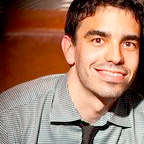Heroes Give, Superheroes Borrow
Last week, Mark Zuckerberg and Priscilla Chan got a big truck and loaded it up with stacks of twenties worth $44,999,999,937.63 (they stopped for gas).
Unfortunately he posted during lunch, so it went largely unnoticed. In all, Zuck Truck garnered just 19 likes and 2 comments:
But the world was equally divided behind the two commenters, as you can see, and the media loves a cage match. Soon experts began attacking other critical components of Mark’s plan, like whether the rubber bands around the cash might suffocate small African warblers if improperly disposed.
All this sound and fury are overshadowing what I believe to be the real depravity of the couple’s announcement. So let’s dispense with the myths and get to the root evil:
You’re probably reading this and saying, “Hey, you’re just defending Mark because he’s your friend!” And you’re probably reading that and saying, “Hey, you’re only calling yourself Mark’s friend to earn some positive news coverage for yourself!” But that’s not true. If I wanted to earn positive news coverage, the best way for me to do that would be to donate $45 billion. Do you agree? If you do, scroll back up and start reading again from the section labeled “Myth #2.”
The above is known in computer science as an infinite loop. It’s a way to forever trap incompetent people on a treadmill of stupidity, draining their mental resources, and ultimately depleting their blood cells of the vital vitamins and precious nutrients that sustain life here on Earth.
Anywho, you made it to this point, so you’ll be able to grok the real intellectual abomination of the Chan Zuckerberg Initiative:
Mark refuses to use his considerable influence to shatter philanthropy’s “glass ceiling.”
We keep hearing about these angelic moguls who pledge to donate “everything.” BILL GATES TO DONATE ENTIRE FORTUNE! WARREN BUFFETT GIVES IT ALL AWAY! Now comes Mark to donate “virtually 100%.”
We’re so distracted arguing over whether or not they’ll really donate everything that we forget to challenge the bedrock assumption: that “everything” is actually the maximum they can give. Mark even reinforces this with classic subliminal messaging:
Here’s the question CNN should be asking: If that’s truly his daughter’s name, why won’t he release “Max’s” birth certificate?
He won’t release it because, if you’re one of the 90 million homeowners living the American Dream, you know in your bones that Mark’s $44,999,999,937.63 contribution is hardly the maximum possible. Think about it: When you purchased your home, you made a downpayment with your money and then borrowed more money. You did this because getting a house with a gazebo was important to you. Well, didn’t Mark say human opportunity etc. was important to him?
If Mark truly wanted to save the world, he would have given away all his money, and then borrowed more money from someone else and given away all their money. This assumes, of course, that Mark’s credit score is above 700 (see CreditKarma.com, the fastest way to check your FICO™ score online).
Yet in a 2,000-word screed to his daughter — whose real name, I’m told, is Diego — the word “leverage” doesn’t appear a single time. Mark Zuckerberg is doing less to cure AIDS than the average American is doing to procure a gazebo.
And therein lies the ugly truth:
By declining to donate even a mere 105% or 110% of his net worth on margin, Mark reinforces the narrative that the billionaire class owes no debt to society once they donate every cent of their money.
This is not an easy thing to say; Mark was once my personal hero. Sure, I’ve overlooked moral failings before, like when he activated Facebook Safety Check during the drunk driving arrest of Michael Phelps — but refused to activate it for any other country’s Olympic criminals:
But all the open letters in the world can’t wash away the fundamental human truth: A hero is someone who leaves everything he has on the field, plus the stuff you loaned him. We must always look past soaring rhetoric to uncover hidden financial motives, and that is why I have decided to pen this essay today.
Disclosure: This is a sponsored post for CreditKarma.com.
